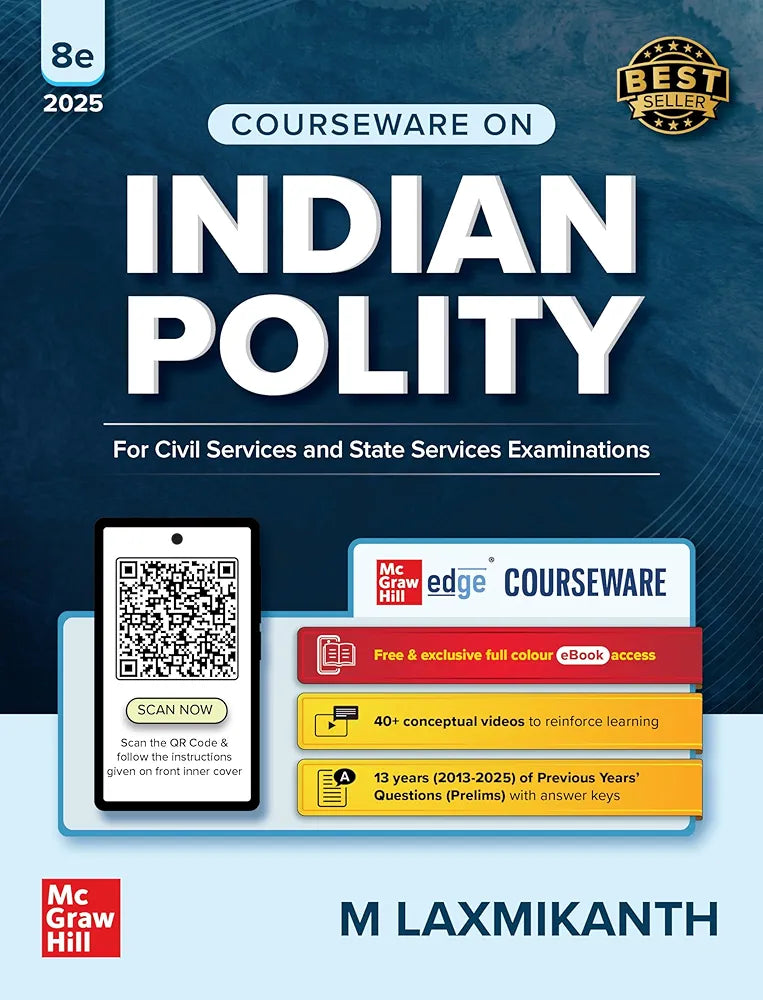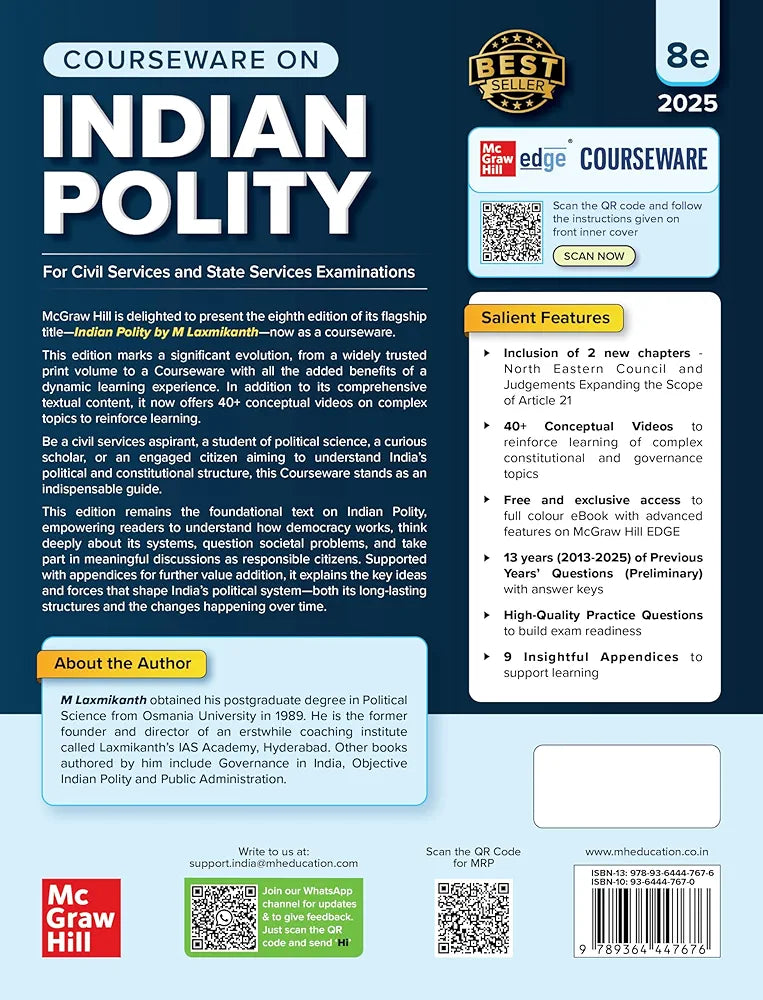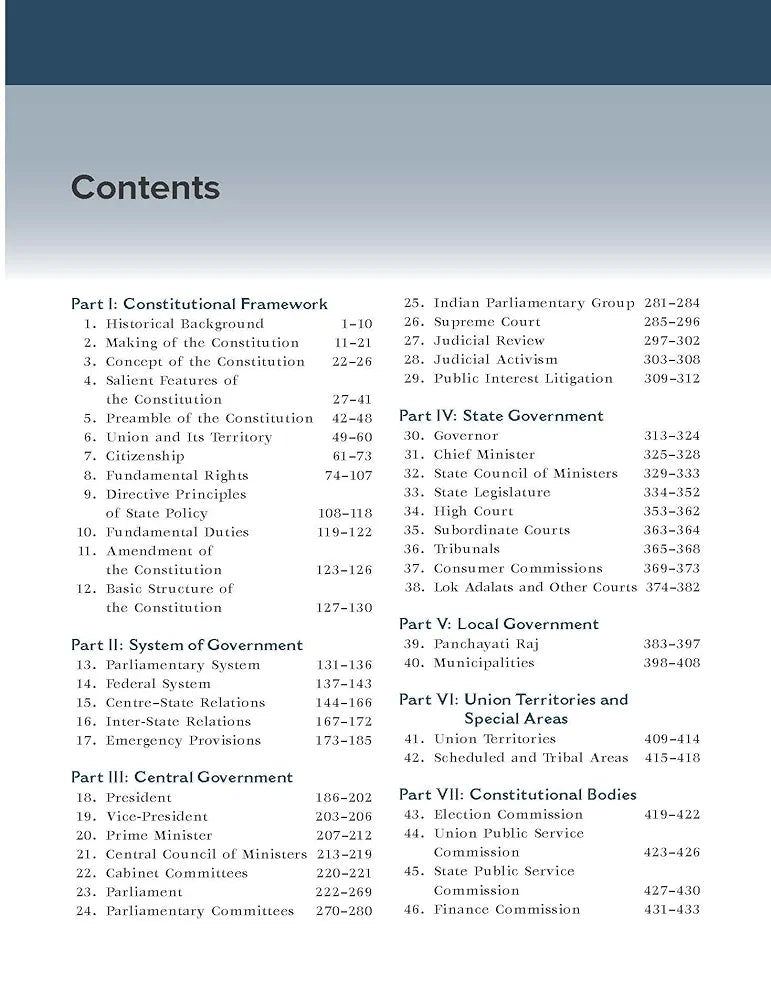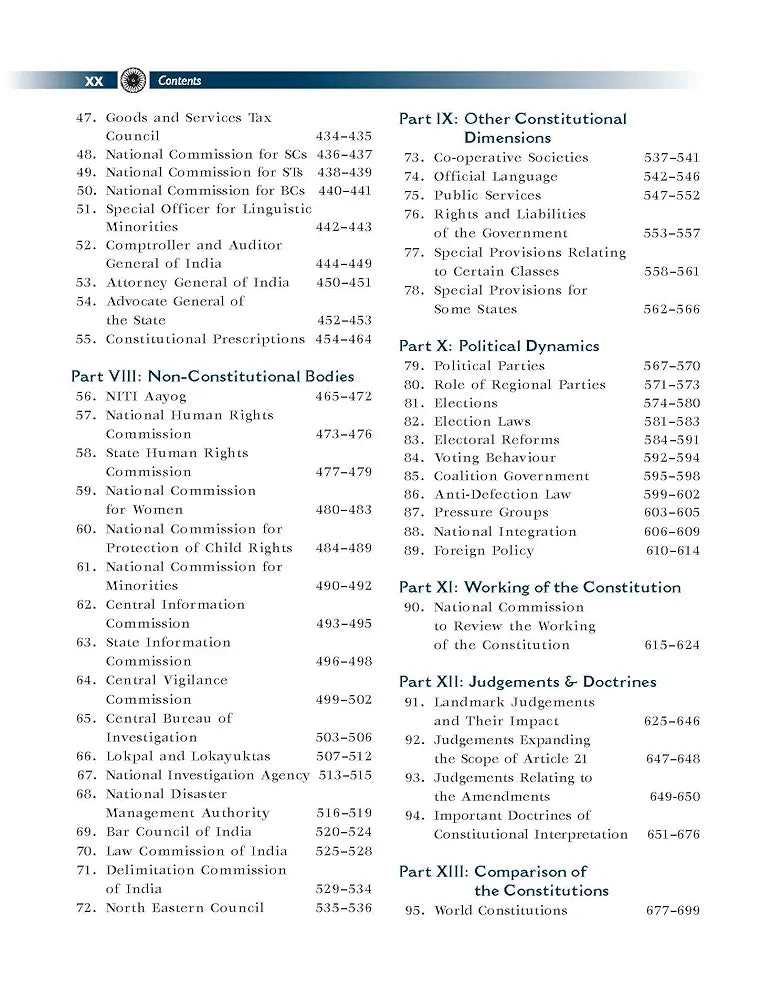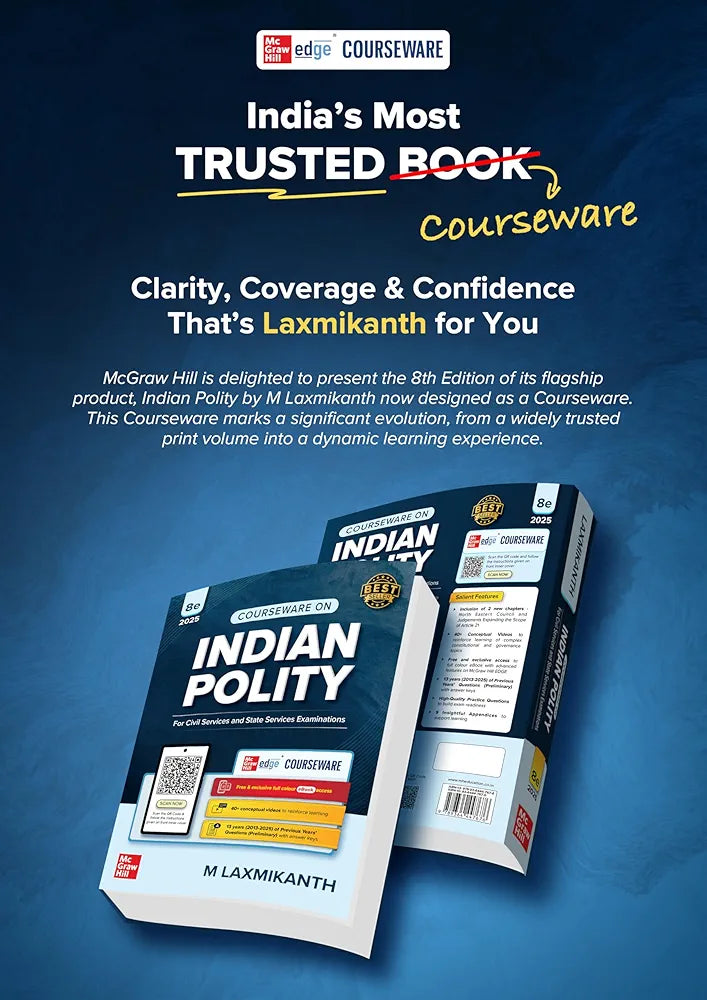Indian Polity Courseware (English), 8th edition by M Laxmikanth for UPSC CSE 2025-26 | 40+ Conceptual Videos | 95 Well-structured Chapters | 18 Insightful Appendices | Full Colour eBook | Solved 13 Previous Years' Prelim Questions (2013–2025) | 12 Years'
Indian Polity Courseware (English), 8th edition by M Laxmikanth for UPSC CSE 2025-26 | 40+ Conceptual Videos | 95 Well-structured Chapters | 18 Insightful Appendices | Full Colour eBook | Solved 13 Previous Years' Prelim Questions (2013–2025) | 12 Years'
Couldn't load pickup availability
📘 Indian Polity Courseware – M. Laxmikanth (8th Edition)
✅ 95 chapters covering the entire Indian political and constitutional spectrum
📱 Free & exclusive access to the full-colour eBook with advanced features on McGraw Hill Edge
🎥 40+ conceptual videos to reinforce learning on complex constitutional and governance topics
📜 Solved 13 Previous Years' UPSC Prelims Polity Questions (including 2025)
📝 Previous 12 years of UPSC Mains Polity Questions included
🎯 High-quality practice questions to build exam readiness
⭐️ 18 Insightful Appendices (9 in book + 9 online) to support learning
📖 About this Courseware
McGraw Hill is delighted to present the 8th Edition of its flagship title, Indian Polity by M Laxmikanth now designed as a Courseware. This Courseware marks a significant evolution, from a widely trusted print volume into a dynamic learning experience.
In addition to its comprehensive textual content, it now offers 3 new chapters, 40+ meticulously crafted conceptual videos simplifying complex concepts, 18 insightful appendices, Previous 13 years of UPSC Preliminary Polity Questions (including 2025) with Answer Keys, Previous 12 years of UPSC Main Polity Questions and a full colour eBook.
An all-time bestseller and one of the most trusted titles continue to be an essential read for aspirants of the Civil Services and other State Services examinations. Designed to meet the needs of not just competitive exam candidates but also postgraduates, research scholars, academicians, and general readers, the eighth edition offers a deeper and more interactive learning experience on India's political and constitutional framework.
💡 What is McGraw Hill Edge Courseware?
McGraw Hill Courseware is an end-to-end learning solution designed to make learning holistic and adaptive to changing examination trends. It goes beyond traditional exam preparation, breaking the mould to give our learners a better chance at success. It seamlessly blends the traditional strengths of static resources like books with cutting-edge digital learning solutions, including, but not limited to:
🎥 Conceptual videos
🧠 Study aids like flashcards and infographics
🔍 Knowledge enrichment content
📜 Previous Years’ Questions with explanations
📝 Mock tests
📊 Performance analytics
🎤 Author webinars & doubt-clearing sessions
📚 Full colour eBook
These features ensure a thorough understanding of the subject matter, enhance learning and retention, provide detailed insights into student performance, and fill gaps in preparation. With the McGraw Hill Edge app, our Courseware can be accessed anytime, anywhere providing full flexibility to the learners. It is interactive and highly responsive to new exam trends; and offers a comprehensive ecosystem that consolidates scattered information into an easily understandable format. McGraw Hill Courseware aims to boost its learners’ confidence by ensuring that they have access to authoritative information, innovative pedagogies and the confidence to elevate their preparation to success!
🗂️ Table of Contents
Preface to the Eighth Edition
Preface to the First Edition
1. Historical Background
2. Making of the Constitution
3. Concept of Constitution
4. Salient Features of the Constitution
5. Preamble of the Constitution
6. Union and its Territory
7. Citizenship
8. Fundamental Rights
9. Directive Principles of State Policy
10. Fundamental Duties
11. Amendment of the Constitution
12. Basic Structure of the Constitution
13. Parliamentary System
14. Federal System
15. Centre–State Relations
16. Inter-State Relations
17. Emergency Provisions
18. President
19. Vice-President
20. Prime Minister
21. Central Council of Ministers
22. Cabinet Committees
23. Parliament
24. Parliamentary Committees
25. Parliamentary Group
26. Supreme Court
27. Judicial Review
28. Judicial Activism
29. Public Interest Litigation
30. Governor
31. Chief Minister
32. State Council of Ministers
33. State Legislature
34. High Court
35. Subordinate Courts
36. Tribunals
37. National Consumer Disputes Redressal Commission
38. Lok Adalat and other courts
39. Panchayati Raj
40. Municipalities
41. Union Territories
42. Scheduled and Tribal Areas
43. Election Commission
44. Union Public Service Commission
45. State Public Service Commission
46. Finance Commission
47. Goods and Services Tax Council
48. National Commission for SCs
49. National Commission for STs
50. National Commission for BCs
51. Special Officer for Linguistic Minorities
52. Comptroller and Auditor General of India
53. Attorney General of India
54. Advocate General of the State
55. Constitutional Prescriptions
56. NITI Aayog
57. National Human Rights Commission
58. State Human Rights Commission
59. National Commission for Women
60. National Commission for Protection of Child Rights
61. National Commission for Minorities
62. Central Information Commission
63. State Information Commission
64. Central Vigilance Commission
65. Central Bureau of Investigation
66. Lokpal and Lokayuktas
67. National Investigation Agency
68. National Disaster Management Authority
69. Bar Council of India
70. Law Commission of India
71. Delimitation Commission of India
72. North Eastern Council
73. Co-operative Societies
74. Official Language
75. Public Services
76. Rights and Liabilities of the Government
77. Special Provisions Relating to Certain Classes
78. Special Provisions for Some States
79. Political Parties
80. Role of Regional Parties
81. Elections
82. Election Laws
83. Electoral Reforms
84. Voting Behaviour
85. Coalition Government
86. Anti-Defection Law
87. Pressure Groups
88. National Integration
89. Foreign Policy
90. National Commission to Review the Working of the Constitution
91. Landmark Judgements and their Impact
92. Judgements expanding the scope of Article 21
93. Judgements Relating to The Amendments
94. Judgements Relating to The Amendments
95. World Constitutions
Appendix I: Articles of the Constitution
Appendix II: Subjects of Union, State and Concurrent Lists
Appendix III: Table of Precedence
Appendix IV: Constitutional Amendments at a Glance
Appendix V: Constitutional Amendments with Reference to Articles
Appendix VI: Model Code of Conduct Relating to Elections
Appendix VII: Flag Code of India
Appendix VIII: Presidents, Vice-Presidents, Prime Ministers, etc.
Appendix IX: Chairpersons of the National Commissions
Question Set I: UPSC Questions on Indian Polity General Studies Prelims (2013-25)
Question Set II: Practice Questions on Indian Polity General Studies Prelims
Question Set III: UPSC Questions on Indian Polity General Studies Mains (2013-24)
Question Set IV: Practice Questions on Indian Polity General Studies Mains
Share
